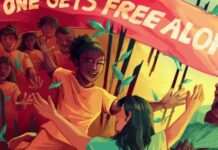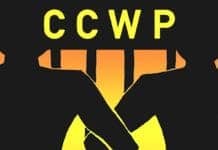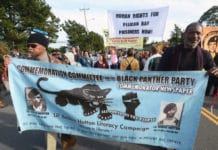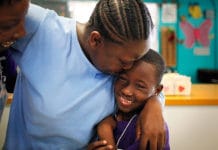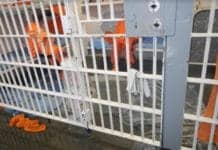by Wanda Sabir

An estimated 1,000 people will converge upon Oakland’s City Hall Wednesday, Jan. 14, at 4 p.m. to demand that those responsible for the murder of Oscar Grant be brought to justice. High profile names expected to attend include E-40, Beeda Weeda, Jennifer Johns, Kev Choice, Zion I and others. The community is also calling for an immediate end to police brutality and terrorism in communities of color across America. Following the rally, demonstrators will peacefully march from City Hall to District Attorney Tom Orloff’s office.
Wanda’s Picks Radio, Friday, Jan. 9
Friday, Jan. 9, on my radio show, Wanda’s Picks, we spoke about the murder of Oscar Grant III at the Fruitvale BART Station in Oakland. More than 100 people were arrested Wednesday, Jan. 7, during the rebellion that broke out after the afternoon rally and protest march. The following day, Jan. 8, the BART board heard seven hours of impassioned testimony at their headquarters and Friday, Jan. 9, at 2 p.m., arrested protesters were arraigned in Room 107 of the Wiley W. Manuel Courthouse in Oakland. Call the Alameda County DA’s office at (510) 272-6222 or fax him at (510) 271-5157 and demand the police officer, Johannes Mehserle, who resigned and remains at large, be charged and arrested for this murder. You don’t have to live in Alameda County to voice your outrage.
The second part of my show was a conversation with Ida McCray and her daughter, Nia Sykes, about California’s incarcerated mothers and their children, who are they and why should we care. Ida founded Families with a Future and Nia works for California Coalition for Women Prisoners. Visit www.familieswithafuture.org and www.womenprisoners.org.
Women inside California’s prisons
I was so excited to finally be able to visit Black women in a Sister-to-Sister visiting program set up by California Coalition for Women Prisoners, an advocacy and policy making organization. An active member of CCWP and a long time advocate for the abolition of prisons and for restorative justice and other such models of equity and justice for victims and perpetrators, I couldn’t sleep the night before – between preparing my radio show in advance, to just wishing the night away. The time before the visit until it was time to leave and walk over to the BART station where I was to get picked up, I just couldn’t sit still. And now that I am home and looking back, the morning after, I still can’t stop or wait to get moving on the pressing civil rights and justice issues I was made aware of through the personal stories of the four women I sat with in the cafeteria between 10 a.m. and 3 p.m.
It was the usual security processing nightmare. After taking off everything I thought would make the alarms go off, I put my earring back on, took the bobby pins out of my hair, checked my bracelets in the locker, took off my coat, gave my pen to a CCWP comrade, and after three tries got through. (We found out later that when the guards ran their copier while processing guests, the machine’s activity made the security gate alarm go off repeatedly.)
I wore all black, a scarf with an African print and earrings shaped like the continent of Africa. I thought my adornment would cheer the sisters up and when the guard looked skeptically at my earrings and then at me and started to tell me I couldn’t wear them, his eyes centered on the Horn of Africa … I had to press my lips together and not speak as he left to consult a colleague. I let out a sigh of relief when he returned and made no comment.

In the parking lot we ran into the other CCWP team, which included an attorney, and once we’d all cleared security and set up, we then proceeded to meet with the women who’d signed up in advance to visit with us. Files were pulled out and materials – articles and the CCWP newsletter, “The Fire Inside” – were given to each woman. We bought refreshments for the women, hot food, salads and fresh fruit, including oranges and avocadoes, which many of the women hadn’t had in a long time. We also bought popcorn, candy and sodas for the women. I called it going shopping and had to press the women into not being thrifty, just asking for what they wanted so we could treat them.
I felt an immediate affinity with the first woman I met. She and I hit it off and felt so connected and happy to be talking to each other. We knew some of the same people like Steve Champion, a good friend of Stanley Tookie Williams. She was the first female member of the Crips, she said. She and Stanley like brother and sister. We discovered we’d also read a lot of the same books and agreed philosophically on a lot of issues, especially on the role of women in Islam, so it was with reluctance that we ended our conversation when I was told our time was up because there were other women waiting to come in to speak to me.
And so it went all day, until my last conversation.
My last interview was with a cute kid, petite, hair braided, she reminded of Sister Souljah’s character “Winter” in looks. There the parallel ended. She was 15 when the ordeal began. A straight A student at the time when she ran away from home, this young woman has spent 13 years behind bars serving a life sentence. I met her last, and couldn’t help but see my daughters reflected in her face. Petite and bright, she could be my child. One impulsive action changed her life forever. It was the same with other women I met, most charged with murder or accessory to murder, the minimum length spent behind bars, 30 years.
These were not old women either. The 28-30 year sentences started when most of the women were 19-20 years old, which meant all of them were either my age or a little younger. I thought about what a waste of human potential and human life these crazy long and punitive sentences were. And then I reflected on the added burden youth or disability added to the situation. One woman battled for spiritual freedom and access to counsel which was open and nonjudgmental. For 15 years she battled ideology which was exclusive and patronizing so she’d have a sense of belonging in a community of believers even if the acceptance was meted out based on conditions, conditions she didn’t agree with.
I sit here the day after heavy with the knowledge that if more citizens understood what goes on behind bars and the important work organizations like the California Coalition for Women Prisoners’ Sister-to-Sister project does, the passage of laws like the recent Proposition 9, which makes it harder for those incarcerated to get paroled, would cease.
My heart went out to the woman I met whose butchered body and chronic pain didn’t stop her from smiling and caring about the women who were not seated in the room with us, as she asked me to address the pressure administration placed on her to have surgeries which are not only ineffective, they are often unnecessary and dangerous to her health.
I met women writers whose stories reflect a reality and a ideology which is often life affirming and filled with success based on a belief that if one doesn’t advocate for one’s rights, a right to decent treatment and a right to freedom and release from bondage, one will never be free. One woman shared her insight into the criminal justice process, a recent one, when she said she believed in the process. She thought if she did what she was told, she would be freed. She learned that this system is not concerned with what is right; it is concerned with continuing a corporation which employs generations in one family.
Children in California’s Central Valley look at law enforcement and the prison industrial system as potential career opportunities. I don’t know the percentages, but with the shrinking agricultural segment of our economy, with the demise of family farming, dairies, ranching and other agriculturally based incomes, the prison system has become the career of choice for physicians, psychologists and high school graduates and drop-outs, police and veterans of war.
Corporations are able to find cheap labor. The imprisoned laborers are the new indentured servants or sharecroppers or sweatshop employees. One doesn’t have to look at Haiti or Korea or Taiwan; look at California’s vast pool of incarcerated women and men and children, and one sees the reasons why blue collar jobs are disappearing, why factories are closing.
Legal advisors are cautioning their clients against going before parole boards unless their cases are air-tight, but when is justice ever on the side of a client whose life is dependent on the will of an appointed judiciary body who often sees its job as one which makes it nearly impossible to ever get out of prison?
I sat speaking to a woman who has organized fundraisers for an organization which reunites mothers with their children. She said the recent fundraiser was her 99th. The amount raised was $65,000 or something like that (my notes are in her folder at CCWP). I was amazed. The way she did it was to connect with a vendor who could supply the items she wanted to sell, such as large bottles of body lotion, buckets of fried chicken and other items, and then had the women purchase these items. With a population of 4,000 at the prison and the quality of the merchandise, coupled with the need, the sale seemed an easy one.
I thought about how great it would be if this same entrepreneur raised such funds for CCWP and for organizations like Ida McCray’s Families with a Future, which seeks to unite children with their incarcerated parents, providing support – specifically psychological support – outside the prison and within for both.
By the time I spoke to the last woman yesterday, I was brain dead literally. I couldn’t remember my name and all the stories were one. I took a water break to clear my head so I could focus. I began to appreciate what Hafsa said on the way down to the prison, that she often felt like crying as she listened to the stories of suffering – let me add, unnecessary suffering – these women have been subject to.
I think about one women’s inability to get denture cream so she can chew, her dentures 35 years old, and that she is ineligible for a kidney transplant because she is incarcerated, yet the renal problems are the result of 15 years incarcerated in a place where the drinking water was polluted, the Valley State Prison for Women. She was transferred to the medical facility because it has dialysis.
I met another woman who was sentenced to Central California’s Women’s Facility the year after it opened in 1990 and has been there ever since. Still another woman requested a transfer to CCWF from a Southern California facility so she could continue her job preparation in information systems. CCWF is where women are executed, and is the larger of the two facilities. Both are overcrowded. CCWF has a juvenile facility where young offenders are housed until they are 18. My last conversation was with an incarcerated woman who turned 18 at CCWF, once she was aged out of the youth correctional facility in Ventura and Sacramento.
See http://www.cdcr.ca.gov/Divisions_Boards/DJJ/About_DJJ/Locations/index.html. Also visit http://www.cdcr.ca.gov/Visitors/Facilities/CCWF.html and http://www.cdcr.ca.gov/Visitors/Facilities/CIW.html.
I am full and this year, as I figure out the second half of this journey and who and what I want to take along for this next portion of the ride, I monitor my energy and think long and hard about not allowing myself to linger in despair or entertain hopelessness. I can’t; these women need me. I wasn’t given these stories to hold; rather it is my job to move them along, to find resources to address the medical malpractice issues facing one woman, the pending board hearing facing another and the righteous anger, grief and regret facing another.
To help, visit www.womenprisoners.org. California Coalition for Women Prisoners volunteer nights are the fourth Wednesday of every month at 6 p.m. at 1540 Market St., Room 490, in San Francisco. For more information, write or call (415) 255-7036, ext. 314, or email info@womenprisoners.org.
Free Women’s Health Summit
A Free Women’s Health Summit will be held from 11 a.m. to 2 p.m. in Oakland at the Lake Merritt Garden Center, 666 Bellevue Ave. For info, contact (510) 238-7906 ljones@oaklandnet.com or www.mayorrondellums.org. Activities include free health screenings by Get Screened Oakland and Healthy Oakland, a physical activity demonstration by fitness expert Andre O’Neil, a cooking demonstration by celebrity chef Nikki Shaw, a panel discussion moderated by Dr. Brenda Wade and much more.
Gaza Protest and March in San Francisco
It seems the Israeli government is in a race against time to crush the people of Gaza before Bush leaves office, a friend wrote in an email recently. She continues, “I don’t know about you, but I can’t sit by while our tax dollars are paying for the weapons being used to terrorize an entire population. This Saturday, Jan. 10, is an international day of protest to call for a real ceasefire.”
“Please join me at the MacArthur BART at 10:30 a.m. The march leaves Civic Center at 11 a.m. to head down Market Street, then back to Civic Center for a rally. Come to all or part of it. Make signs, bring noise-makers, spread the word!”
Bishop T.D. Jakes’ ‘Not Easily Broken’ opens

It’s always the case, isn’t it, that what one person doesn’t appreciate another person will? Well, given the fact that I don’t know his novels, I can’t say if the story follows a formula or style. But it is pop fiction and in that sense has a clear good and evil framework: problem mother-in-law, workaholic wife, the other woman and, in this case, the moral man, plus tragedy.
“Not Easily Broken” perhaps because of its all star cast, had me on the edge of my seat. For a bishop, the story is kind of racy, the story certainly contemporary in nature. There is nothing shallow or predictable here.
The protagonists are a real estate sales woman and her husband, a retired jock from the ghetto, who has a business which isn’t going anywhere. She is materialist and he is inattentive and a failure as far as she is concerned, but he has another life his wife doesn’t share and this is as a volunteer coach in his old neighborhood.
The male comradery in the film runs the gamut as the threesome range from henpecked to player to the protagonist, who is committed but vulnerable – will he cheat on his wife? I guess I could have gotten upset over the overly simplified woman character who is his wife, but I liked the male characters enough to let her go along with the other women in the story, who is an equally shallow placeholder.
“Not Easily Broken” is certainly a twist on the Tyler Perry films whose themes and characters seem to take their cues and perspectives from the woman scorned camp. Bishop Jakes’ perspective is male and one sympathizes with the wronged husband even as she prays he doesn’t give into temptation. I guess the title says it best, a reference to the bond of marriage, a yoke which is not easily broken if God is the third strand in the bond.
It’s a cute chick flick with a twist: It’s for the guys.
‘Being Broke Is a Waste of Life: Financial Strategies for 2009′
This workshop is with Mr. Paul Hart, Saturday, Jan. 10, 1 p.m., at the Elijah Muhammad Cultural Center, 1702 Bond St., Oakland. If you believe “To be rich, you must learn from the broke and do not do what they do nor think how they think, then perhaps you might be interested in reciting Success Tool No. 20, verse 23:
“Thou shalt not be broke! Thou shalt not be economically illiterate! Economic illiteracy must be called immoral, because an atmosphere of economic illiteracy will financially retard the environment of a population. The people will no longer be impervious to conscious and subconscious influences and acts of manipulation that encourage them to accept the mentality and the behavior of immoral conduct.” – from “The Success Tools of the Masters” by Antar Jannah Mandela
The following is a list of the top 12 principles of the rich, according to Jannah:
1. Broke people give up when things don’t go their way; a few disappointments and they are onto something else, saying things like “it wasn’t for me.” The rich work harder and become more determined when things go bad and understand that you have to take the bad with the good to make it.
2. Broke people always have an excuse. Rich people say “my fault” and refuse to make excuses.
3. Broke people think that not getting what they want is OK. Rich people are disgusted at the thought of not getting what they want and will do whatever it takes.
4. Broke people always have to talk it over with their broke friends to make sure no one will make fun of them if they make a decision. Rich people think for themselves and could care less what their broke friends think.
5. Broke people are never coachable and teachable. Rich people are always learning; even when the money starts coming in, they never stop learning from those who were there first.
6. Broke people are scared of others. Rich people trust in others and know that other people are crucial for their success.
7. Broke people are always procrastinating; they would rather talk about it, read about it, think about it, but never seem to do anything about it. Rich people hate not getting it done.
8. Broke people think rich people are lucky. Rich people put themselves into a position to be “lucky” and then work hard to make the “luck” show up.
9. Broke people work by the hour. Broke people want to know that after one hour of work they have something to show for it. Rich people find broke people who think like that and make them their employees.
10. Broke people think that if no one is doing a particular thing, it must be wrong. Rich people think that if no one is doing something, it means more money for them.
11. Broke people think that if everyone (all 200 people at the meeting in a city of 1 million) is doing something, it must be saturated. Rich people think that broke people aren’t too bright.
12. Broke people think it is OK for other people to live where they want to live, drive what they want to drive, and do what they want to do. Broke people are OK with the fact that they can’t do these things. Rich people get sick just thinking about being average. Broke people think that other people’s opinions are worth more than their dreams. Rich people know that their dreams are worth more than other people’s opinions.
globalFEST live and archived on WNYC
As the media sponsor of globalFEST, WNYC Radio is committed to bringing the sounds and spirit of the festival to an audience beyond the music hall. Beginning Friday, Jan. 16, full recordings of all of the artists’ performances will be available on demand at www.wnyc.org. In addition, during the week of Jan. 19, select performances will be highlighted on WNYC’s Evening Music and New Sounds with John Schaefer, which air nightly on WNYC 93.9 FM. On Jan. 11, WNYC will present globalFEST as a LIVE webcast at www.wnyc.org, with a special behind-the-scenes preview beginning at 6 p.m.
At the Sixth Annual globalFEST at NYC’s Webster Hall, 12 artists from around the world on three stages perform in concerts to coincide with the annual APAP conference Jan. 11. They are the Hot 8 Brass Band, La Troba Kung Fu, Kailash Kher’s Kailasa, Brooklyn Qawwali Party, Shanbehzadeh, L&O, Marcio Local, Calypso Rose, Occidental Brothers, Tanya Tagaq, Chiche Libre and Watcha Clan. For tickets and information, call the World Music Institute at (212) 545-7536, visit http://www.ticketmaster.com/ or call (212) 307-7171.
Music
There is great music in the usual haunts this week and this month. The Oakland Public Conservatory is hosting Free Jazz Fridays beginning next month through May. Ramsey Lewis is in town next week; so is James Moody. Kim Nalley is singing at the end of the month in San Francisco. Bobby Hutcherson with special guest Anthony Wilson closes the month at the same venue. Visit www.yoshis.com.
Other highlights are the David Hardiman and his 19-piece San Francisco All-Star Jazz Band benefit for Music in the Schools Jan. 19 and the Oaktown Jazz Workshops Benefit Wednesday, Jan. 21. Both should be great and these two programs and men, Hardiman and Khalil Shaheed, are keeping jazz alive in the San Francisco Bay Area. I am going to invite both of them on my radio show, so stay tuned. Also stay tuned for a tribute to musician Prince Lasha later this month. I’m thinking about Friday, Jan. 24, 8 a.m. Visit my show at http://www.wandaspicks.asmnetwork.org.
Keep your eyes open to the following: La Pena Cultural Center has some great concerts scheduled, as do Anna’s Jazz Island and Ashkanez. Intersection for the Arts has a wonderful season planned. Oh, and don’t miss “Porgy and Bess” at the San Francisco Opera or the season lineup for the conclusion of the Oakland East Bay Symphony, San Francisco Performances, Cal Performances or Yerba Buena Center for the Arts. I’ll have more about “Porgy and Bess” later.
Art and politics meets motherhood
I have been out of town and just getting back into the groove as I try to catch the art exhibits closing I mentioned last week. My elder kid is turning 30 – yes, where does the time go? – 30 … I remember the run to Alta Bates and the delivery, which was intense but not hard or unbearable (smile). What a great woman she has become, my daughter Bilaliyah. I think my finest work by far has been my children (smile).
Bay View Arts Editor Wanda Sabir can be reached at wsab1@aol.com. Visit her website and blog at www.wandaspicks.com for an expanded version of Wanda’s Picks, her photos and her radio show.

 Store
Store




